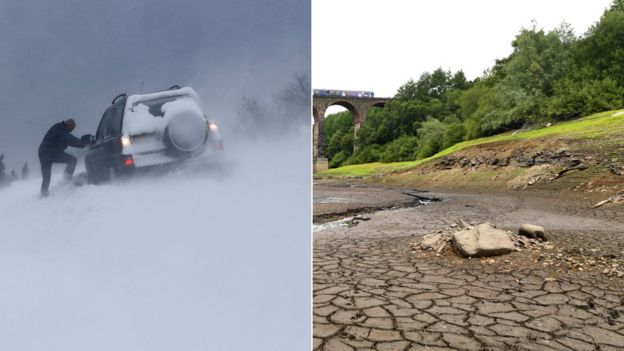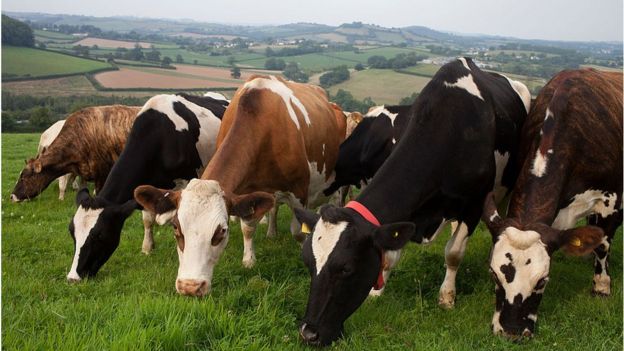Meat, vegetable and dairy prices are set to rise "at least" 5% in the coming months because of the UK's extreme weather this year, research suggests.
Consultancy CEBR said 2018's big freeze and heatwave would end up costing consumers about £7 extra per month.
It follows price warnings from farmers' representatives about peas, lettuces and potatoes.
Wholesale prices of other vegetables have already soared by up to 80% since the start of the year.
But the Centre for Economics and Business Research (CEBR) explained that these increases can take up to 18 months to fully have an effect on shoppers.
"So, while the worst of the recent heat may have passed, the cost to consumers looks set to climb," it warned.
The UK saw record temperatures in June, July and August which caused widespread drought and crop failures.
This, along with a "wet, cold and challenging" winter, particularly the cold spell caused by the Beast from the East, has put stress on farming costs and yields, CEBR said.
As a result, it said:
- Wholesale vegetable prices had jumped between March and July, with onion prices up 41%, carrots by 80%, and wheat for bread by a fifth
- The farm gate price of butter has climbed 24% since March, as hot weather hampered grass growth for grazing.
- Meat prices are set to rise due to a shortage of livestock feed.
 REUTERS/PA
REUTERS/PA
It said these "wholesale price shocks" were likely to push up consumer costs by about £45m per week - equivalent to £7.15 per month per household.
'Effectively bare'
Tod Bulmer from Kenyon Hall Farm near Warrington said yields from his fruit and cereal harvest had been half of what he would normally expect.
He told BBC Radio 4's Today programme that the potential price rise would compensate "a little bit but not enough".
He added that the low yields meant dairy farmers were having to pay more for their feed.
National Farmers' Union president Minette Batters said the shelves for feeding livestock were "effectively bare" and that dairy farmers were having to rely on silage meant for winter use.
"Many farmers are looking at £60,000 of added costs," she said.
She added that she was still waiting on the government to deliver on a promise to take action.
 GETTY IMAGES
GETTY IMAGES
Following a drought summit earlier this month with the NFU, Environment Secretary Michael Gove said the government would do "whatever it takes" to maintain food supplies.
Earlier this month, the Agriculture and Horticulture Development Board warned that livestock and vegetable prices would be a "little bit higher right the way through until next spring" because of weather issues.
Shortages of vegetables also helped drive food price inflation to 1.6% in July - up from the 1.2% in May and June, according to the British Retail Consortium and Nielsen.
A spokeswoman for the Department of Environment, Food and Rural Affairs said: "Food prices are affected by a number of factors aside from the weather, such as fuel costs, international commodity markets and exchange rates."
She said steps had been taken to help those affected, including allowing farmers to take more water from reservoirs and providing flexibility on funding.
She added that the hot weather had helped boost products such as soft fruits and wine.
But the CEBR said there was bad news for wine fans too, as severe hailstorms in the French wine regions of Bordeaux, Champagne and Cognac "have eliminated millions of bottles of product".
No comments:
Post a Comment